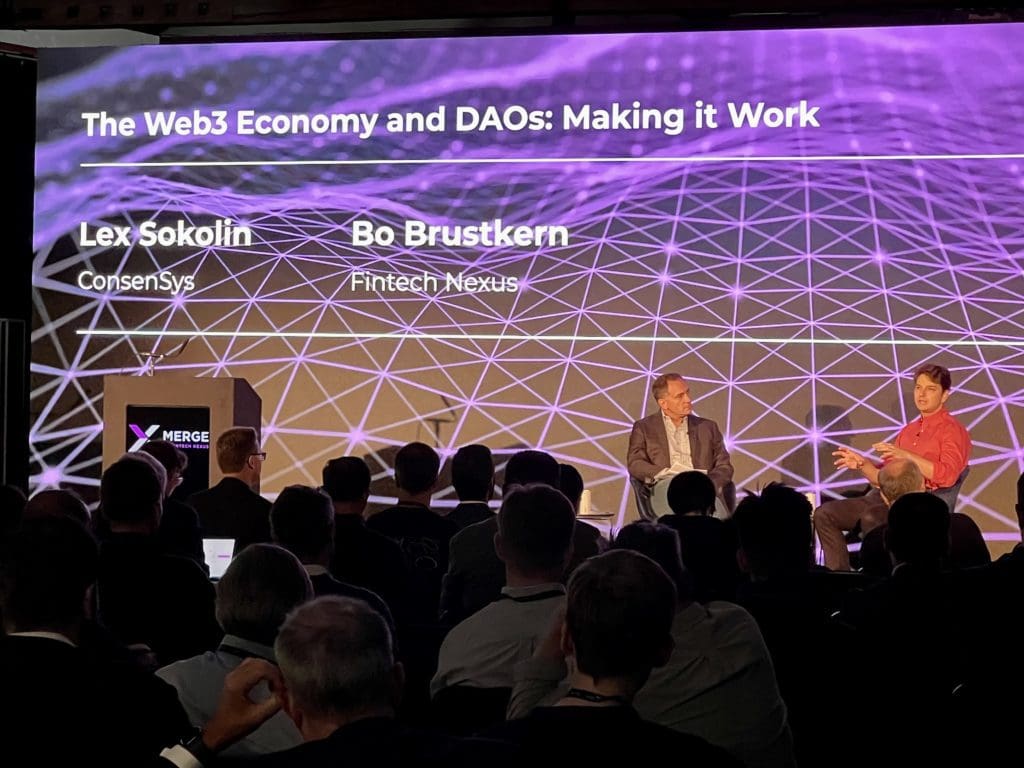Daily, there is news about the pitfalls and limitations of DeFi.
“I think the question is what’s the tail and what’s the dog,” said Lex Sokolin, head economist at Consensys.” A lot of the conversations are about the tail, and that is wrong as a strategy.”
Today at Fintech Nexus’ Merge event, Sokolin and Fintech Nexus CEO and Co-founder Bo Brustkern spoke about the state of the Web3 economy and its importance for the future of fintech.
“To me, DeFi is a continuation of the application of technology to the financial sector,” said Sokolin. “The missing piece for me and my journey is DeFi.”
‘Software is eating the world’… and then everything has maxed out
Regardless of who you speak to, fintech in itself is a relatively new development. Sokolin placed the start of financial services’ evolution into fintech at the beginning of the 2000s.
“The internet starts to bite at various sectors of the economy,” he said.
He explained that the global digitalization of society started to be integrated into the financial system. The focus was to reframe traditional finance within a digital setting, and in doing so, it could have created a gap.

“You are in this kind of weird half-place,” he continued. “You’re in the place of a Spotify trying to sell you CD ROMs or a Netflix trying to sell video cassettes.”
He explained that much of the development of fintech had created international user footprints of millions; however, companies are still struggling to monetize and build commercial models. Competing on a level with less clout than a traditional financial institution, providing similar products with a different interface.
“DeFi comes at it from a very different place. It is much less concerned about what features are going to make you happy, or how to get you addicted to the dopamine rush of trading in stocks. But much more concerned with how to manufacture financial products.”
“It’s a factory of financial products.”
A factory run by the ‘creative class’
Unlike the traditional finance sector, much of the current DeFi ecosystem is made by a younger, more informal demographic. Devs and DAO contributors are forming the building blocks of DeFi, using chat platforms like Discord instead of boardrooms to discuss its evolution.
“Everything that has been built over the last 30-40 years of banking, whether it’s the banking systems, the portfolio management systems, or the underwriting systems, is largely irrelevant and uninteresting to decentralized finance because it requires none of it. If anything, all of that is a burden for the new factory,” said Sokolin.
“If you think about the traditional financial services manufacturing plant as being coal power. DeFi is solar power. And it runs on smart contract platforms and on these decentralized chains. And it has very different mathematics and economics around how the factory of financial products works.”
Regardless, the components of traditional finance products, such as payments, lending, banking, and insurance, are available, set within this new, digital native infrastructure.
“So now we’re in a very interesting place because we have the million user persona footprint of the fintechs, which are not doing so well. And then you have the manufacturing engines of this different ecosystem. And the two are now starting to come together.”
He referenced firms such as Revolut and Robinhood, giants in fintech which are now turning to the manufacturing of the DeFi sector.

‘Money in motion’ could drive the DeFi infrastructure
The sector’s potential is significant, but this early stage of development remains faulty.
Much of the focus has turned to the proper regulation of the space, with many perceiving this as the major gateway to mass adoption. However, Sokolin sees this as a step perhaps too far along for the current ecosystem.
“Financial Services on its own is not an industry that can that can exist without context,” he said.
He explained that in building a village, the construction of a bank too early on would not survive. “Everyone would starve.”
“What you do is start the economy. You start farming, start building, you start creating, you start having commerce, you start growing the population, there’s labor and economic output, and surplus value, and so on.”
“It’s only once you establish an economy and your community has something that they’re doing to survive that is actually productive, then the first derivative is okay, well, there’s money in motion for commerce; you’re paying… what’s the infrastructure for transferring that worth?”
“You need money because you have an economy, not because money is a thing. It’s an abstraction to make our interaction easier.”
He explained that the “money in motion” will create the need for additional financial products; banking for surplus money at rest, and once banking deposits are established, will come lending and investment.
“A lot of what’s happened recently is self-referential financial engineering that tries to integrate with the real economy and was largely lost or denied or didn’t have the right connectivity…to plug into the traditional economy.”
“So to me, the next phase and the piece that’s missing for this transformation of FinTech to DeFi is that DeFi isn’t a repackaging of the traditional financial sector for the traditional economy…so for me that the next step is for Web3, is it needs to develop a GDP of its own and an economy that is productive and functional.”
DAOs taking the place of corporations
Decentralized Autonomous Organisations (DAOs) could be the critical piece of this puzzle.
Much as corporations provide an organization of cooperation within traditional finance, the DAOs create the same within a decentralized context.
Sokolin explained that applying many components that make up the traditional economy would not work in this context.
“It doesn’t make sense to create a paper LLC and then shove it into Discord, because that’s nonsense.”
He felt the fundamental way to embrace the opportunity of DeFi is to meet the community where they are, within the digital landscape.
Like explorers, the individuals behind Web3 are discovering the new world of digitalization and blockchain. The existence of DAOs could be essential to this context, creating an economy within the new territory of DeFi.
“DAOs are the fundamental building blocks out of which you’re getting cooperation, economic activity, and GDP,” he said. “Then DeFi becomes the banking sector for people’s productive things in these digital venues.”


